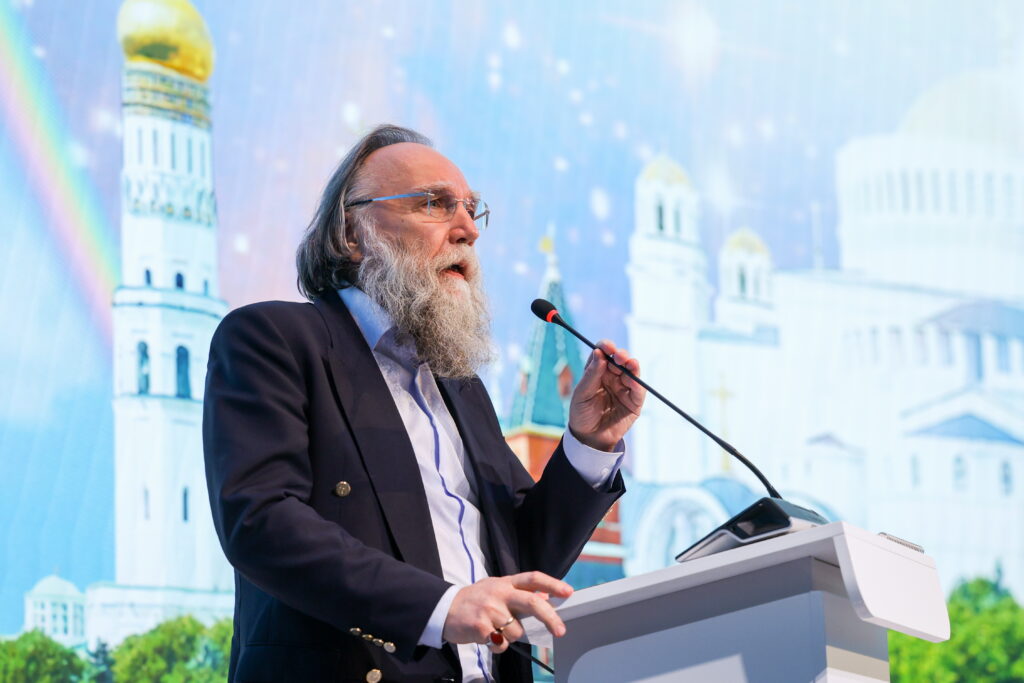Vladimir Putin is clearly preparing for a new term of office and has actually started his election campaign. He has been opening infrastructural facilities, attending ever more meetings with the public, and trying to prove that both himself and the belligerent Russia have many supporters among leaders of other countries. However, considering the age of the Russian president, his health status and public behaviour (not always adequate), the succession scenario becomes quite likely in the relatively near future. The classic succession scenario will hardly be possible in this case. In the 2000s and the early 2010s, Putin’s people at the top of the hierarchy of power were quite monolithic and able to resolve issues in their narrow circle. This means that this group could nominate a successor from among its ranks and get the presidential approval. At present, the upper part of the hierarchical structure is a motley mosaic of ‘old Petersburgers’, ‘the court’ (e.g. former security guards), children of ‘Petersburgers’, and career-focused officials. These subgroups have little in common: they have differing views on the future of the country, the world, and life in general. Therefore, Vladimir Putin’s successor will most likely get this role as a result of a combination of factors. Firstly, thanks to the personal technocratic influence on the president. Secondly, owing to accumulated resources, infrastructure and a major personal project. Thirdly, thanks to a paradoxical combination of ambition and lack of personal conflicts. The latter two points are essential for the candidate to present himself to the elites as the best ‘consensus candidate’ who will manage the country and take the interests of key groups of influence into account.
There are several individuals in the top league of Russian officials who have such influence coupled with resources. As ambitious figures, they have deliberately built their images and accumulated resources in order to at least retain their place in the hierarchy and, preferably, to grow further. Five such figures can be distinguished at present, namely: Prime Minister Mikhail Mishustin, Moscow Mayor Sergey Sobyanin, Deputy Prime Minister Marat Khusnullin, First Deputy Head of the Presidential Administration Sergey Kiriyenko, and Presidential Envoy to the Far Eastern Federal District Yury Trutnev. Each has a distinctive image and resources, and some also have their own personal projects and infrastructure that will help them to become ‘consensus candidates’ for presidency on behalf of the elites. Now is a good moment to review their resources: after the presidential campaign, or even earlier, Putin may put an end to the personnel pause and ‘reassign’ the top bureaucratic staff. This will redistribute the balance of resources, but will not completely eliminate it.
Mikhail Mishustin: Successor by virtue of his office
Mikhail Mishustin is the prime minister and the second person in the country, this status being his main resource. Since Vladimir Putin is advanced in years, Mishustin will automatically assume his duties in case of the president’s illness or death. The Russian elites have become familiar with the prime minister: they have had enough time to work with him and accept him as ‘their own man’. Influential groups are familiar with Mishustin’s working style and his closest business entourage. It is believed that the prime minister is fairly close to Igor Sechin, the head of Rosneft, but even if this is true, the Mishustin has also built up his own political profile during his three years in office. During his PR campaign, he has proven to the elites that, firstly, he is a real prime minister within the allotted powers, interested in this very position (unlike his recent predecessors). The second goal of the campaign has been to show that the prime minister is a promising politician who knows how to communicate with the citizens, the bureaucrats and the elites. Mishustin travels all over the country, talks to people, gives presents to children, and knows how to joke with those who come to his meetings. In a sense, he is already replacing Vladimir Putin, who has been increasingly withdrawing into virtual ‘multipolar worlds’ and ‘civilisation-states’, disconnecting himself from reality. The president’s inner circle widens this gap even further by organising a suitable audience for Putin, consisting of ‘volunteers’, ‘pioneers’ and ‘activists’, who try to entertain the head of state. In contrast, Mikhail Mishustin personally interacts with a wide audience. He shows that he can effectively work as an interface for the Russian government and engage in efficient governance in the hard times of COVID and sanctions.
Mishustin has obvious disadvantages: he has no network of influence outside of the government. Moreover, the prime minister’s control is rather blurred due to the peculiarities of the power structures, where each sphere of work has its own supervisor, personally approved by, and accountable to, Putin. However, the ‘magic’ of an official post and the overall inertia play a significant role in Russia’s politics. It would be easy for the prime minister, who is de facto in charge of operational management, to intercept the levers of control over the country in the event of force majeure.
Sergey Kiriyenko: The king of political infrastructure
During his seven years as head of the internal political bloc of the presidential administration (PA), Kiriyenko has managed to seriously expand his formal and informal powers, as well as the functionality of his position. Under Vladislav Surkov and Vyacheslav Volodin, the political bloc was responsible for constructing the regime’s pseudo-ideological cover, providing personnel support for some governor appointments and conducting election campaigns. Kiriyenko has organised a system of training courses, seminars and competitions for current and future officials. Since those initiatives are closely intertwined, many of the Russian mid- to high-level bureaucrats can be said to be personally connected to Kiriyenko and his team. Naturally, they may (and most often do) belong to the orbit of some other elite group, but nevertheless owe their career success also to Kiriyenko. The political bloc widely advertises its competitions and governor schools, highlighting how many successful administrators have attended them. In this way, the first deputy head of the presidential administration tries to pull new people under his wing, and sends a signal to former trainees, as if saying «I have helped you.» Communication with graduates is constantly maintained through seminars and forums: for this purpose, the PA and Sberbank have established a joint project called the Senezh School of Management. In this way, a significant proportion of the Russian mid-rank bureaucrats (at the level of governors and deputy federal ministers) are in constant interaction with Kiriyenko’s team. They form his net of influence, his talent pool, and a powerful resource that can be used as a trump card when bargaining with the elites. This can also be Kiriyenko’s advantage as a consensus candidate for presidency.
During his time in the Kremlin, Sergey Kiriyenko has managed to organise collaboration with the Ministry of Education and the Ministry of Science, and his associates have helped those structures to create propagandist courses and classes for university students and schoolchildren. Teachers at these courses as well as school tutors also undergo training at Kiriyenko’s forums and seminars: the PA political bloc has a network of year-round venues for this purpose. Moreover, Kiriyenko’s team has created a new pioneer organisation, the ‘Movement of the First’, coordinated locally by low- and medium-rank regional and municipal officials, and by teachers at schools. As a result, Kiriyenko’s network has significantly expanded: the coordinators of the ‘Movement of the First’ are involved in ideological work with young people and receive funding for this purpose. They are indirectly oriented towards the political bloc connected with the PA. Collaboration with federal agencies has not only helped Kiriyenko to expand his field of influence, but has also demonstrated his ability to negotiate and communicate.
Thanks to technological progress, Sergey Kiriyenko has become more influential than his predecessors in the Russian media space. The Internet has traditionally been curated by the first ‘political’ deputy head of the PA. between the early 2000s and the end of the 2010s, the online world attracted the most politically active Russians, i.e. a relatively small part of the total population. On the other hand, television and tabloids were the main source of information for the masses, supervised until today by the second deputy head of the PA Alexey Gromov. However, 31% of Russian citizens do not watch television in principle while an increasing number of citizens mostly use online sources when searching for the news. The sphere that used to be peripheral for the Kremlin is gradually becoming crucial, and Kiriyenko already controls it. His son runs Vkontakte, the largest social media network, whereas ANO Dialogue, which is co-ordinated by the PA, handles online campaigns at the federal and regional level. Consequently, Sergey Kiriyenko has his own online empire, which is a very powerful resource. Another mighty resource is the corporate mobilisation during the elections: this aspect has been fully fine-tuned during Kiriyenko’s term in office. Political technologists close to the PA know how to make sure that employees of state-owned corporations and companies loyal to the state show up at polling stations. Combined with the mobilisation of public sector employees, this renders impressive results for candidates promoted by the authorities, and drives very high turnout. The existence of such mobilisation pools is a good trump card and an important resource in Kiriyenko’s hands.
Last year, Sergey Kiriyenko was entrusted with an additional area to supervise, namely the annexed territories of Ukraine (DNR, LNR, parts of Zaporizhzhya and Kherson Oblasts). In those areas, he deals not only with political, but also with social and economic issues. He inspects infrastructure facilities, hospitals and schools, promises payments and assistance. Kiriyenko’s close supervision over the territories occupied by Russia should serve as a reminder that he is not just a political manager (and former head of Rosatom), but also a good economic administrator. It is symptomatic that he makes trips in the company of government officials (such as Tatyana Golikova, the deputy prime minister for social affairs), who do not behave like superiors but rather like Kiriyenko’s subordinates.
Thus, the first deputy head of the presidential administration has influence over the talent pool, with a ready-made infrastructure of governors and mid-rank government officials. Sergey Kiriyenko is creating a network of financially motivated public sector employees associated with his bloc: they can potentially become campaigners in free elections. Kiriyenko has also achieved corporate mobilisation and built a database of people employed in large corporations. At the same time, he is working to prove is governance skills, also under extreme conditions.
Sergey Sobyanin: The chief economic administrator
Since the time of Yury Luzhkov as the head of Moscow administration, the status of the capital’s mayor has always been accompanied by the image of a ‘tough economic administrator’ who may not be very good at politics, but knows a lot about handling the infrastructure and attracting investments. Sobyanin also has this kind of image, but unlike the simple-minded Luzhkov, he emphasises his modern profile. Sobyanin has been running Moscow for 13 years without getting into conflict with any major elite group during this time. His office signs contracts with companies that are close to the Rotenberg brothers and Gennady Timchenko (businessmen from Vladimir Putin’s inner circle), and co-operates with Mikhail Kovalchuk’s Kurchatov Institute. Concord, Yevgeny Prigozhin’s company, supplied meals to Moscow schools. To many Russian governors, Sobyanin’s management practices are an example to follow, with the capital’s mayor being a role model. They try to utilise the same transport development schemes, carry out housing renovation, organise festivities and festivals, and attempt to engage in urban development. Indeed, Sobyanin and his team in Moscow were the first to set the example in all such activities.
The mayor’s office may well serve as a source of federal-level personnel: two former officials work at key positions in the federal government, i.e. Deputy Prime Minister for Construction Marat Khusnullin and Minister of Economy Maxim Reshetnikov.
Sobyanin has also developed his own political techniques. His administration has engaged with moderate liberal opposition figures, such as former Parnas co-chairman Vladimir Ryzhkov, and allowed him to succeed in the by-elections to the Moscow City Duma. For ordinary Muscovites, who evaded both ultra-patriotism and oppositionism, the mayor’s office strived to create a highly apolitical atmosphere with Moscow as a city of services, culture and entertainment. The city administration has been trying to preserve this atmosphere even in times of war. But this certainly does not mean that the mayor of Moscow is a great democrat and a champion of freedoms. The city authorities have learnt the lessons of the 2019 Moscow City Duma elections, when more than a dozen candidates from Alexei Navalny’s Smart Voting initiative made it to the city parliament. For the 2021 State Duma elections, Moscow administrators envisaged an electronic voting system (DEG), and insistently asked employees of the public sector and municipal enterprises to use it. In most single-member constituencies, opposition nominees were winners at off-line polling stations, supported, again, by the Smart Voting initiative. However, after the introduction of the DEG, United Russia turned out to be the official winner in all districts. This practice was expanded during the Moscow mayoral election: Muscovites were offered the option to vote via electronic terminals even at brick-and-mortar polling stations. This practice can be replicated throughout the country in order to obtain the desired voting results.
Sergey Sobyanin’s assets include his image as the country’s chief economic administrator, the capital city as a showcase of advanced governance practices, and experience in interacting with the majority of elite groups while taking their interests into account. Finally, the mayor is able to offer an alternative to the Kremlin’s political system and a way to ensure ‘correct’ vote counting.
Marat Khusnullin and Yury Trutnev: Project masters
Deputy Prime Ministers Marat Khusnullin (in charge of the construction sector) and Yury Trutnev (in charge of the Far Eastern Federal District, combining his government post with the position of the Plenipotentiary Envoy) also seem to be a logical choice among the potential successors who are in command of projects and resources. Personally favoured by Vladimir Putin, they interact with large elite groups by virtue of their work, and are understood by them. Some people from both teams have also received posts at the federal level. Trutnev’s assets include a fairly active political bloc in his envoy’s office, which tries to pacify the protests in the Far East and often succeeds in doing so. The deputy prime ministers, of course, are less visible than Sobyanin, Mishustin, and Kiriyenko, but they try to gain favour mostly with Vladimir Putin, and only then with everyone else. On the other hand, their ‘less stellar’ status can be a strong argument in case they want to become consensus candidates: such successors will be less likely to pull the blanket over themselves and try to impose their own rules, at least initially.
Not the only one, but a possible one
Of course, the nomination of a ‘consensus successor’ to Putin, acceptable for the key elite groups and in charge of his own project and resources, is only one possible scenario. If the president himself tries to determine his successor, it is quite likely that he will settle on one of the above-mentioned figures. All of them are among his favourites, trying to earn his support in one way or another. Alternatively, Putin may opt for one of his guards. However, it appears that the experiments with promoting Federal Guard Service (FSO) officers are almost over. The governor of Tula Alexey Dyumin, after the mutiny of his good friend Yevgeny Prigozhin, has kept a low profile, and any serious talks of possible succession are over for him. In another scenario, one of the elite groups may try to impose its own candidate, but such success is unlikely to last long. The majority of the Russian elites of Putin’s era do not know how to share: inevitable conflicts will begin, likely followed by negotiations.
Therefore, the variant with a ‘consensus candidate’ appears to be the most realistic option, and the characters suitable for this type have already prepared their projects and proposals to display. By the way, some of the potential candidates may well enter into situational alliances with each other: Prime Minister Sobyanin is quite imaginable under President Mishustin (and vice versa), Khusnullin may become the head of the government under Sobyanin, while Trutnev gets along with Kiriyenko. Unlike the ‘old Petersburgers’, the ‘project-managing technocrats’ are quite able to make friends and establish collaborations. Of course, with personal gain in mind.
This pool of resources cannot be said to be stable and static. After the presidential election, Vladimir Putin will inevitably address personnel issues: after all, many officials are record-breakers in Putin’s current system (such as Anton Vaino, head of the PA, or Kiriyenko). It is also possible that personnel issues will be resolved before the elections, even if for publicity purposes. An official who moves to another post usually loses the accumulated resources, networks of influence or infrastructure (at least partially). Reassigned officials need to build their base anew, which is another reason why Vladimir Putin has shuffled personnel regularly, making sure people from his entourage do not become too comfortable in their chairs.
However, there is a clear exception in the list of potential successors: Sergey Sobyanin has just been re-elected mayor. For him, the only possible move is upwards: to the post of prime minister, with the possibility of keeping his trusted man as the head of the capital city. In this case, Sobyanin will become the favourite in the succession race, retaining his former resources and acquiring new ones. Most likely, Kiriyenko is also counting on becoming the prime minister: he has already managed to secure Rosatom, run by his old associate Alexey Likhachev. Kiriyenko’s powerful roots in the system of education, propaganda, and electoral mobilisation should help him stay in office. A career track leading to the post of prime minister is also logical for Marat Khusnullin, but he will definitely not be unhappy to stay in his current post. Even if he does not move horizontally, he will most likely be able to retain some control over the construction industry (this happened in Moscow, where Khusnullin was deputy mayor for a long time). In contrast, the reassignment may affect the positions of Mikhail Mishustin and Yury Trutnev: the former needs to hold on to his position, while the latter needs to avoid losing his resources in the Far East. Moreover, the only way for Trutnev to genuinely increase his influence and resources is to become prime minister.
In order to see the dynamics of the system—for example, the balance of resources controlled by key bureaucrats, or the upcoming redistribution of forces—we need to imagine the ways for these figures to enter the new stage of the power game. The stock-taking of their resources can help us to draw the overall picture and keep track of losses and gains, thus reflecting their current status as potential presidential successors.










